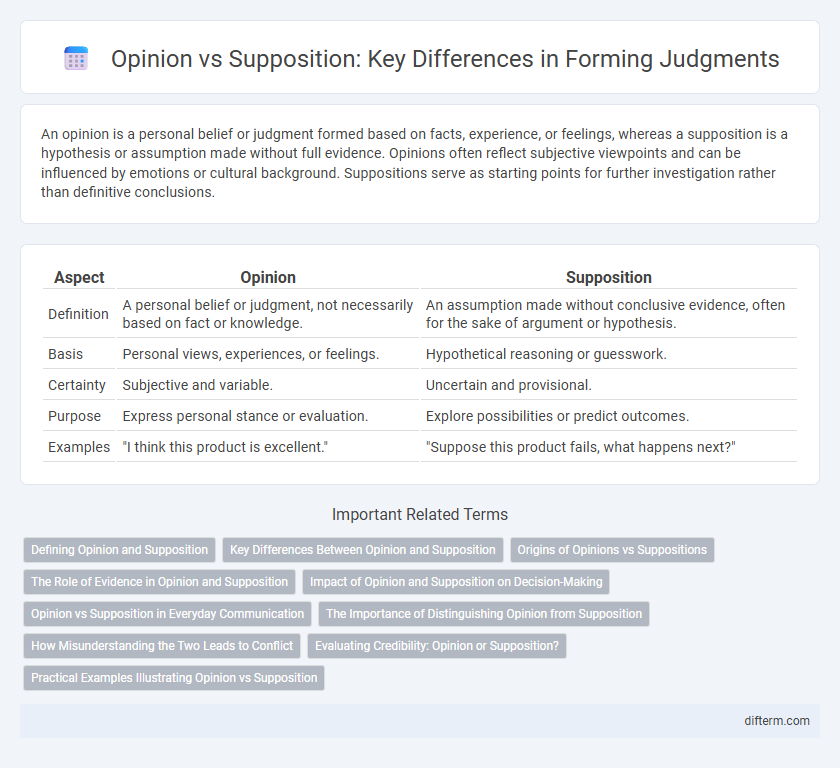An opinion is a personal belief or judgment formed based on facts, experience, or feelings, whereas a supposition is a hypothesis or assumption made without full evidence. Opinions often reflect subjective viewpoints and can be influenced by emotions or cultural background. Suppositions serve as starting points for further investigation rather than definitive conclusions.
Table of Comparison
| Aspect | Opinion | Supposition |
|---|---|---|
| Definition | A personal belief or judgment, not necessarily based on fact or knowledge. | An assumption made without conclusive evidence, often for the sake of argument or hypothesis. |
| Basis | Personal views, experiences, or feelings. | Hypothetical reasoning or guesswork. |
| Certainty | Subjective and variable. | Uncertain and provisional. |
| Purpose | Express personal stance or evaluation. | Explore possibilities or predict outcomes. |
| Examples | "I think this product is excellent." | "Suppose this product fails, what happens next?" |
Defining Opinion and Supposition
Opinion represents a personal belief or judgment shaped by individual experience and values, often lacking definitive proof. Supposition involves assuming something to be true without concrete evidence, relying on conjecture or hypothetical scenarios. Understanding the distinction clarifies how opinions reflect subjective perspectives while suppositions function as tentative assumptions for further analysis.
Key Differences Between Opinion and Supposition
Opinion reflects a personal belief or judgment formed from individual experiences and preferences, often subjective and emotionally influenced. Supposition involves assuming something to be true without conclusive evidence, typically used as a basis for reasoning or hypothesis. The key difference lies in opinion being a subjective viewpoint, while supposition is an assumed premise pending validation.
Origins of Opinions vs Suppositions
Opinions stem from individual beliefs, experiences, and personal judgments shaped by cultural, social, and psychological factors. Suppositions arise from hypothetical reasoning or assumptions made without concrete evidence, often used as a basis for exploration or argumentation. The origin of opinions is deeply rooted in subjective interpretation, whereas suppositions originate from deliberate conjecture or theoretical premises.
The Role of Evidence in Opinion and Supposition
Opinions are often grounded in personal beliefs or experiences, whereas suppositions rely heavily on assumptions without firm evidence. The role of evidence is crucial in distinguishing a credible opinion from a mere supposition, as it provides a factual basis that supports the viewpoint. Without concrete evidence, suppositions remain speculative and lack the persuasive power of well-substantiated opinions.
Impact of Opinion and Supposition on Decision-Making
Opinion shapes decision-making by reflecting individual beliefs and experiences, influencing choices through subjective judgment. Supposition introduces hypothetical scenarios, allowing decision-makers to explore potential outcomes and uncertainties before reaching conclusions. Balancing opinion with supposition enhances critical thinking and leads to more informed, well-rounded decisions.
Opinion vs Supposition in Everyday Communication
Opinions express personal beliefs or judgments shaped by experiences and emotions, while suppositions are assumptions made without firm evidence. In everyday communication, opinions provide insight into individual perspectives, helping to build understanding and dialogue. Suppositions often guide hypotheses or decisions but require validation to avoid misunderstandings.
The Importance of Distinguishing Opinion from Supposition
Distinguishing opinion from supposition is crucial for clear thinking and effective communication, as opinions are based on personal beliefs or judgments while suppositions rely on assumptions without firm evidence. Recognizing this difference prevents misunderstanding and enhances critical analysis in debates, research, and decision-making processes. Accurate identification of opinions versus suppositions ensures arguments are grounded in credible interpretations rather than speculative or unfounded claims.
How Misunderstanding the Two Leads to Conflict
Confusing opinion with supposition often causes misunderstandings because opinions are subjective beliefs, while suppositions are assumptions lacking evidence. This misinterpretation escalates conflicts as parties treat assumptions as facts, leading to faulty conclusions and emotional reactions. Clarifying the distinction between these concepts promotes better communication and reduces unnecessary disputes.
Evaluating Credibility: Opinion or Supposition?
Evaluating credibility requires distinguishing between opinion, which reflects personal beliefs supported by reasoning or experience, and supposition, which is a hypothesis lacking concrete evidence. Opinions often hold weight when grounded in expertise or factual context, whereas suppositions remain speculative until validated by data. Assessing the source's authority and the presence of corroborating evidence helps determine the reliability of statements as credible opinions rather than mere suppositions.
Practical Examples Illustrating Opinion vs Supposition
Opinion reflects a personal belief or judgment grounded in individual experience or interpretation, such as stating that a particular movie is the best of the year. Supposition involves forming a hypothesis or assumption without firm evidence, exemplified by guessing the outcome of a sports game based on team stats alone. Differentiating between opinion and supposition can be clarified by examining practical scenarios where opinions are subjective declarations, whereas suppositions require testing or verification to gain credibility.
opinion vs supposition Infographic

 difterm.com
difterm.com